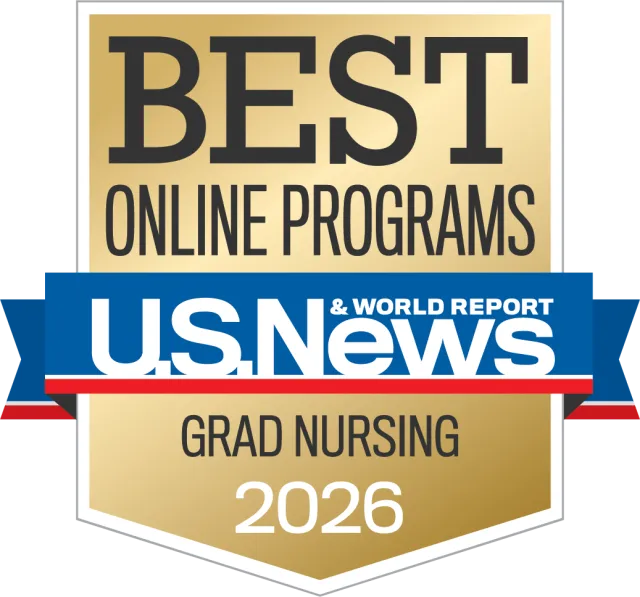Bridge from RN to MSN-AGNP in as few as 2 years
| Accreditation | CCNE accredited,1 Accredited by the Higher Learning Commission |
|---|---|
| Clinicals | 585 clinical hours—Herzing pledges clinical placement |
| Immersion Exp. | 180-hour, 16-week immersion experience to prepare you for your first AGNP job |
| Format | 100% online classes |
| Certification | Prepare for key AGNP industry certifications: the Adult-Gerontology Primary Care Nurse Practitioner (A-GNP) certification from the American Academy of Nurse Practitioners (AANP), and the Adult-Gerontology Primary Care Nurse Practitioner Certification (AGPCNP-BC) from the American Nurses Credentialing Center (ANCC) |
| Dual credit | Earn dual credit towards a Doctor of Nursing Practice (DNP) |
| QuickPaths | Transfer credit, stackable credentials, and adaptive learning technology build a faster pathway to a higher education with Herzing University |
Learn More Today!

Ranked by U.S. News & World Report as one of the best online graduate nursing programs in 2026
Accelerated Online RN to MSN-AGPCNP Program Option
The RN to Master of Science in Nursing in Adult Gerontology Primary Care Nurse Practitioner degree is a 64-credit graduate program (RN to MSN) which prepares you for a career as an AGPCNP.
The online degree program provides students with fundamental knowledge and skills in health policy and management, research methods and evidence-based practice, health promotion across the life span, women's health, and much more.

Career-focused curriculum
Discover the crucial knowledge and skills required to succeed in your work and build a foundation for continued career growth.
Flexible schedule
We work hard to help you maintain school-life balance, striving to be as flexible as possible for busy non-traditional students.
Virtual services
Access to extensive virtual services, including academic advising, tutoring, support services, technical support and library services.
Lifelong support
We support your ongoing career advancement by providing comprehensive, personalized student services with lifelong career coaching.
Rolling admissions
No application deadlines to worry about. Apply when you’re ready and prepare to get started soon.
RN to MSN-AGPCNP program classes & curriculum details
Our program is designed to help associate-level nurses earn the education and skills needed to apply for certification as an AGPCNP.
All classes are delivered online with 585 total clinical hours, including a 180-hour immersion experience designed to help you earn your first job as a primary care nurse practitioner.
How to go from RN to BSN to MSN-AGPCNP
This pathway combines our online RN to BSN and BSN to MSN-AGPCNP degree programs. You can view their respective curriculums with all course information here:
| Program | Months i | Semester Credits |
|---|---|---|
| Master of Science in Nursing (MSN) in Adult Gerontology Primary Care Nurse Practitioner - Accelerated RN-MSN (MSNAGPCNP) | 24 | 64 |
i. Average number of months for students to complete program.
Required Bridge Courses
All courses, 16.00 semester credit hours, are required prior to completing graduate level coursework.
Required Core Courses
All courses, 15.00 semester credit hours, are required.
Required Direct Care Courses
All courses, 9.00 semester credit hours, are required.
Required Specialty Courses
All courses, 24.00 semester credit hours, are required.
Clinical Proficiency Exam and Policy
The following modules are 0.00 semester credit hours associated with the policy outlined above. Students are required to take as co-requisite module along with NU 611, NU 642, NU 664 or NU 671, depending on the program of study. Module Number Module Name Semester Credit Hours NSG 0600 Clinical Proficiency Module 0.00 NSG 0600R Clinical Proficiency Remediation Module (if needed) 0.00
Tuition & Cost
Tuition & Cost
The cost of tuition for the RN to MSN-AGPCNP program option is $770 per credit.
You can potentially earn even greater savings by transferring credit from prior college coursework, applying for financial aid, or potential partnership opportunities through your employer.
Our goal is your career advancement. That’s why we are always working to improve our curriculum and processes to make our program as affordable as possible while preparing you best for success in your work.
Scholarships & Financial Aid
You may be eligible for multiple scholarships and grants—including our Nurses Circle of Achievement scholarship, which offers up to 10% tuition reduction.
Military/Veteran Discounts
Veterans, Active Duty U.S. Servicemembers, and spouses may qualify for a 10-20% tuition discount.
RN to MSN-AGPCNP program enrollment prerequisites
Enrollment requirements are the same whether you choose the accelerated RN to MSN-AGPCNP or pursue RN to BSN to MSN-AGPCNP path. Prerequisites include:
- Live in a state where Herzing University is authorized to offer the RN to MSN program
- Hold a current, active and unrestricted license as a registered nurse (RN) in the same state in which they practice
- Hold an associate degree (ADN/ASN/AASN) in nursing from a nationally or regionally accredited college or university
- Participate in an interview to identify your goals and determine if the program is right for you
Eligible states for enrollment: Alabama, Alaska, Arizona, Arkansas, California, Colorado, Connecticut, Delaware, Florida, Georgia, Hawaii, Idaho, Illinois, Indiana, Iowa, Kentucky, Louisiana, Maine, Maryland, Massachusetts, Michigan, Minnesota, Mississippi, Missouri, Montana, Nebraska, Nevada, New Hampshire, New Jersey, New Mexico, North Carolina, North Dakota, Ohio, Oklahoma, Pennsylvania, Rhode Island, South Carolina, South Dakota, Tennessee, Texas, Utah, Vermont, Virginia, West Virginia, and Wisconsin.
We Pledge Clinical Placement
Worried about clinical placement? You don't have to be.
At Herzing, clinical placement is built into your experience—because it's essential, and you deserve a program that treats it that way.
There's no guesswork. Just a proven framework backed by a promise. Our promise is your placement.

Choose your path to go from RN to AGNP
RN to BSN to MSN-AGPCNP Path
Earn your BSN, then begin working towards your master’s degree.
- Curriculum built to help you earn a BSN and MSN faster
- How long? 32 months on average
- Earn a bachelor’s degree that may be required by some employers
Accelerated RN to MSN-AGPCNP
Bridge right to AGPCNP in the Herzing Accelerated RN to MSN program.
- Complete your MSN faster than stopping out for a BSN
- How long? As few as 2 years (24 months)
- Best for nurses looking to enter the workforce as soon as possible
Waived Enrollment Fee
Discover the educational pathway designed to maximize your career potential. Reach for greater heights with Herzing University.
Pursue a growing career path



The evidence suggests qualified caregivers for the adult and elderly population will be in huge demand in the coming decades.
The U.S. Census Bureau projects that for the first time in U.S. history, people older than 65 will outnumber those under 18 by the year 2034. By 2030, all baby boomers will be older than age 65, meaning about 1 in every 5 U.S. residents will be at retirement age.
Combined with a Bureau of Labor Statistics (BLS) projection of 40% growth in the nurse practitioner profession from 2024-2034, the need for NPs capable of delivering adult and geriatric care appears ready to surge.
AGPCNP represents an opportunity for you to join the ranks of a collaborative team dedicated to managing patients’ long-term healthcare needs.
Faq
Frequently Asked Questions
Didn't find the answer to your question? Send us an inquiry and we will be happy to answer all your questions!
Here’s a selection of the most common types of nurse practitioners:
- Family Nurse Practitioner (FNP)
- Adult Gerontology Acute Care Nurse Practitioner (AGACNP)
- Adult Gerontology Primary Care Nurse Practitioner (AGPCNP)
- Pediatric Nurse Practitioner (PNP)
- Psychiatric Mental Health Nurse Practitioner (PMHNP)
- Women’s Health Nurse Practitioner (WHNP)
Each specialty has its own unique requirements in terms of job experience and certification.
According to the American Association of Colleges of Nursing (AACN), core competencies for Adult Gerontology Primary Care Nurse Practitioners include:
- Contributes to improved knowledge and care of the adult gerontology population
- Uses scientific knowledge and theoretical foundations to detect psychological, physiological, and sociological development and aging
- Be a leader facilitating the coordination and planning to deliver care to the adult gerontology population
- Promotes safety and risk reduction
- Continually evaluates the quality of care delivery models
- Integrates appropriate technologies into deliver healthcare in remote, face-to-face encounters
- Aids in the development of health promotion programs within a health community or system
- Provides wellness promotion and disease prevention services balancing the costs, risks and benefits to individuals
That’s just a sample! As an AGNP you will carry many different responsibilities as a crucial member of a healthcare team.
According to the Bureau of Labor Statistics, nurse practitioners earn an average salary of $132,000 per year ($63.46 per hour).*
NPs specializing in adult gerontology in primary care may increase their earning potential by becoming board certified, gaining valuable experience and continuing their education.
There are two types of general NPs: Adult Gerontology Primary Care Nurse Practitioners (AGPCNPs) and Family Nurse Practitioners (FNP). Both NPs provide ongoing health counseling, prevention and management for their patients.
The primary difference is the patient population they care for: FNPs practice across the lifespan in family practice, including pediatric, adult, and geriatric care. AGNPs work only with adolescent, adult, and geriatric patients.
If you are open to working with children you may choose the FNP path, while those who prefer to work with adults only may choose the AGNP path.
Nurse practitioners have an expanded scope of practice compared to registered nurses. In addition to RN duties, nurse practitioners may also write prescriptions, order lab tests, diagnose illnesses, and more (although specifics vary by state). NPs have greater autonomy in delivering patient care, and for that reason, the education requirement is higher.
Learn more about how to go from RN to nurse practitioner.
Yes.
In the past, there were separate designations for Adult Nurse Practitioners (ANP) and Geriatric Nurse Practitioners (GNP). Now the two roles have been combined into Adult Gerontology Nurse Practitioner (AGNP). The knowledge and skills developed in an MSN or DNP-AGNP program will best prepare you to work with geriatric/elderly patients.
Graduating with an MSN or DNP degree and becoming board certified as a primary care nurse practitioner (AGPCNP-BC) will qualify you to practice as an NP and pursue a geriatric specialty.
Primary care AGNPs are responsible for providing continuous, comprehensive medical care for patients across the adult lifespan (13 and older). AGNPs work primarily in outpatient care settings helping patients develop their personal healthcare assessments and manage long-term chronic illnesses.
AGNPs work under the supervision of a physician, with varying degrees of autonomy. They do not “specialize” in a traditional sense, acting as big picture managers of a patients’ healthcare plan and facilitating connections to specialized care as necessary. However, nurses can begin their NP career in primary care and branch into a specialty of their choosing later, such as acute care or mental health.
Practicing as an AGNP requires close collaboration with a team of healthcare staff dedicated to the long-term health needs of their patients.
While there are some similarities between the two main types of adult gerontology nurse practitioners, these are the biggest differences between primary care NPs and acute care NPs:
We offer multiple options for current nurses of all types, including pathways for ASN/ADN, BSN, and MSN degree holders.
View our available online Adult Gerontology Primary Care Nurse Practitioner programs.
While both jobs involve outpatient primary care under the “general NP” umbrella, the biggest difference between AGNP and FNP is the patient population. FNPs are trained for family practice across the lifespan, including children, while AGNPs are trained only for the adult lifespan (adolescent through end of life).
Program Finder
RN to MSN - Adult Gerontology Primary Care Nurse Practitioner
OnlineTo learn more about this program, click the Request Info button.

Choose your NP pathway
Considering all of your options for nurse practitioner specialties?
Herzing University offers multiple nurse practitioner programs for current nurses holding an associate, bachelor's, or master's degree in nursing.
Our goal is to help you walk your career path no matter where you are, or where you want to go.
Explore Herzing NP programsAccreditation & Disclosures
1. The master's degree program in nursing at Herzing University Madison is accredited by the Commission on Collegiate Nursing Education (http://www.ccneaccreditation.org). Herzing University is approved to offer programs in an online learning modality through association with the main campus in Madison, Wisconsin.
Herzing University is accredited by the Higher Learning Commission (hlcommission.org), an institutional accreditation agency recognized by the U.S. Department of Education.
* BLS pay estimates calculate the median annual wage for various occupations. Per the BLS the median wage for an occupation is: "The wage at which half of the workers in the occupation earned more than that amount, and half earned less. Median wage data are from the BLS Occupational Employment and Wage Statistics survey." Bureau of Labor Statistics (BLS), U.S. Department of Labor, Occupational Outlook Handbook 2024. BLS median wage estimates do not represent entry-level wages and/or salaries. Multiple factors, including prior experience, age, geographic market in which you want to work, and degree level and field, will affect career outcomes, including starting salary and earnings as an experienced employee. Herzing neither represents that its graduates will earn the median salaries calculated by BLS for a particular job nor guarantees that graduation from its program will result in a job, promotion, particular wage or salary, or other career growth.
Recent Blog Posts
Waived Enrollment Fee
Discover the educational pathway designed to maximize your career potential. Reach for greater heights with Herzing University.






